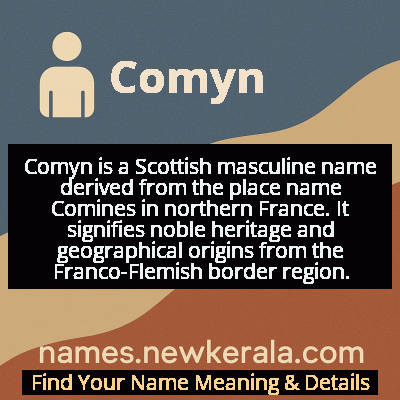Comyn Name Meaning & Details
Origin, Popularity, Numerology Analysis & Name Meaning of Comyn
Discover the origin, meaning, and cultural significance of the name COMYN. Delve into its historical roots and explore the lasting impact it has had on communities and traditions.
Name
Comyn
Gender
Male
Origin
Scottish
Lucky Number
7
Meaning of the Name - Comyn
Comyn is a Scottish masculine name derived from the place name Comines in northern France. It signifies noble heritage and geographical origins from the Franco-Flemish border region.
Comyn - Complete Numerology Analysis
Your Numerology Number
Based on Pythagorean Numerology System
Ruling Planet
Neptune (Ketu)
Positive Nature
Intuitive, analytical, spiritual, and inquisitive.
Negative Traits
Secretive, reserved, aloof, and can be overly critical.
Lucky Colours
Green, yellow.
Lucky Days
Monday.
Lucky Stones
Cat’s eye, moonstone.
Harmony Numbers
1, 5, 6.
Best Suited Professions
Scientists, researchers, spiritual leaders, detectives.
What People Like About You
Depth of knowledge, analytical skills, spirituality.
Famous People Named Comyn
John Comyn
Scottish nobleman
Lord of Badenoch and claimant to Scottish throne during Great Cause
John Comyn III
Scottish nobleman
The Red Comyn, whose murder by Robert the Bruce changed Scottish history
William Comyn
Scottish nobleman
Earl of Buchan and Justiciar of Scotia, established Comyn power in northern Scotland
Alexander Comyn
Scottish nobleman
Earl of Buchan and Constable of Scotland, among most powerful medieval Scottish nobles
Name Variations & International Equivalents
Click on blue names to explore their detailed meanings. Gray names with will be available soon.
Cultural & Historical Significance
The family's dramatic downfall during the Wars of Scottish Independence, particularly the murder of John Comyn III by Robert the Bruce in 1306, marks a pivotal moment in Scottish history that ended their political dominance but cemented their legendary status. The Comyn legacy endures through Scottish folklore, historical literature, and physical remnants of their power including castle ruins across Scotland. Their story represents the complex interplay of family ambition, national identity, and the transition from feudal aristocracy to centralized monarchy, making the name synonymous with medieval Scottish nobility and the turbulent birth of the Scottish nation.
Extended Personality Analysis
The Comyn name carries associations of leadership, strategic intelligence, and strong familial loyalty, reflecting the historical characteristics of the noble family that bore it. Individuals with this name are often perceived as natural leaders with a commanding presence, combining traditional values with practical wisdom. The historical Comyns were known for their political acumen and ability to maintain power through changing circumstances, suggesting that modern bearers might exhibit adaptability, resilience, and the capacity to navigate complex situations with grace and determination.
There's also an element of ambition and territorial awareness associated with the name, stemming from the family's extensive landholdings and political influence. This might translate to modern personality traits including a strong sense of responsibility, protectiveness toward one's community or family, and a drive to build lasting legacies. The name's historical weight may inspire a connection to heritage and tradition, potentially manifesting as respect for history, cultural preservation, and a dignified, somewhat reserved demeanor that commands respect without seeking attention.
Modern Usage & Popularity
In contemporary usage, Comyn remains predominantly a surname rather than a first name, though it occasionally appears as a given name in families with strong Scottish heritage connections. The name maintains particular presence in Scotland, especially in regions historically associated with the Comyn family such as the Highlands and northeastern Scotland. Among Scottish diaspora communities in countries like the United States, Canada, and Australia, the name serves as an important link to ancestral roots and cultural identity. While not commonly used as a first name in mainstream contexts, its appearance reflects a broader trend of reviving historical Scottish names and honoring family lineages. The name's aristocratic associations and deep historical roots give it an air of distinction and tradition that appeals to those seeking unique names with meaningful heritage connections.
Symbolic & Spiritual Meanings
Symbolically, the Comyn name represents the enduring power of legacy, the complexities of political ambition, and the intersection of personal destiny with national history. It serves as a metaphor for both the heights of achievement and the vulnerability of established power structures. The name evokes themes of territorial authority, strategic alliance-building, and the delicate balance between family interests and broader national concerns. Historically, the Comyns embodied the medieval ideal of noble responsibility—protecting lands, administering justice, and maintaining order—while also demonstrating the potential pitfalls of excessive ambition and political rivalry.
The dramatic narrative of the Comyn family's rise and fall carries symbolic weight about the cyclical nature of power and the importance of adaptation in changing circumstances. Their story represents how family names can become vessels for historical memory, carrying forward lessons about leadership, loyalty, and the consequences of political choices across generations. The name thus symbolizes not just individual identity but collective historical experience, connecting modern bearers to centuries of Scottish tradition and the ongoing dialogue between past and present.

